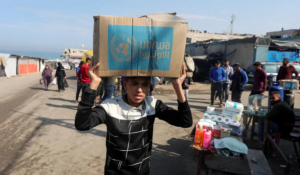British, Danish foreign ministers denounce Israeli legislation against UNRWA

Distribution of UNRWA aid in central Gaza, in November 202
Liza Rozovsky reports in Haaretz on 14 January 2025:
As signs of progress emerge from Doha on a Gaza cease-fire deal, in Europe, diplomatic and public pressure is being exerted on Israel to end the war and boost humanitarian efforts in the Gaza Strip. During visits to Israel and the region this week, British Foreign Secretary David Lammy and Danish Foreign Minister Lars Lokke Rasmussen criticized the Israeli ban on UNRWA’s activity in the country and cooperation with the agency.
On Tuesday, Britain’s Lammy met with Foreign Minister Gideon Sa’ar in Jerusalem. The foreign secretary also met with Strategic Affairs Minister Ron Dermer in Israel, as well with the families of several of the hostages, including the family of Emily Damari, who holds British citizenship.
In a statement after his visit, the foreign secretary described the humanitarian situation in Gaza as “desperate” and expressed his “grave concern” regarding Israel’s legislation against UNRWA, due to go into effect on January 30. “Israel has a responsibility to ensure there is a clear plan to provide ongoing humanitarian assistance,” he said.
Additionally, Lammy said he told Israeli officials that “Israel must avoid civilian casualties, protect civilian infrastructure including health facilities, allow unfettered aid into Gaza through all land routes, and ensure the UN and its humanitarian partners can operate effectively.”
On Monday, the United Nations Office for the Coordination of Humanitarian Affairs (OCHA) reported that in Gaza, “Israeli authorities continue to deny UN-led efforts to reach Palestinians with vital aid.”
Israel’s Coordinator of Government Activity in the Territories (COGAT) called the claim “false and baseless,” and said “Israel permits humanitarian aid to enter Gaza and allows humanitarian teams to operate there.”
OCHA also reported that “only seven out of 22 UN-planned humanitarian movements (transports of humanitarian aid) were facilitated by the Israeli authorities. Six were denied outright, five were impeded, and four were cancelled due to security and logistical challenges.” COGAT responded that it has no knowledge of these figures.
Denmark’s Rasmussen met on Monday in Jerusalem with Foreign Minister Sa’ar, who expressed Israel’s intention to go forward with the anti-UNRWA legislation. “Yeah, we definitely do not look eye to eye on that issue,” Rasmussen said after their meeting.
The Danish foreign minister, who will serve as president of the EU Council during the second half of 2025 and whose country began its rotation on the UN Security Council this year, said that though there are problems with UNRWA, his country supports the agency and “can’t see any alternative…at least not in a short-term perspective.”
He added that he wasn’t sure what the situation would look like once the laws go into effect and said Denmark and Israel must continue to discuss the issue. The ministers’ comments are consistent with the attitude of most of the donor countries to the organization since Israel’s Knesset passed the legislation in late October. At the time, seven foreign ministers, including those of Canada, Australia, Germany, France and Britain, expressed their “grave concern.”
However, some European diplomats have implied that there is a certain degree of understanding for this move, designed to significantly curtail UNRWA’s activity. Sweden, a UNRWA donor, announced in late December that it would cease its funding of the organization, but refrained from expressing support or understanding for the Israeli legislation. The country said it would channel the humanitarian aid it is sending to Gaza through other agencies. Swedish Minister for Foreign Trade and International Development Benjamin Dousa said, “What matters to the Swedish government is that the aid reaches its destination.”
In Israel and in UNRWA donor countries, there are no clear plans for transferring UNRWA’s tasks and authorities to other organizations.
One European diplomatic source told Haaretz that while there is at least a theoretical understanding about which agencies could replace UNRWA in terms of supplying food and health services, it is not at all clear who will oversee the shelters that UNRWA operates in Gaza.
According to UNRWA, hundreds of thousands of people are currently residing in the schools that it ran prior to the war and which are now serving as shelters for the displaced.
The article has been reproduced in its entirety.
